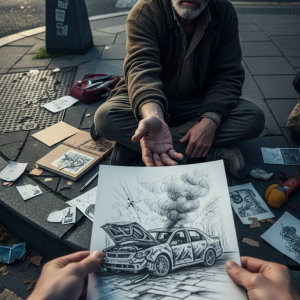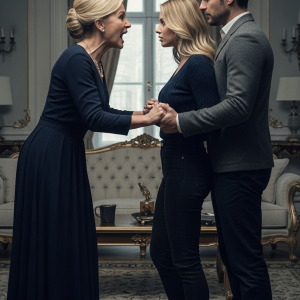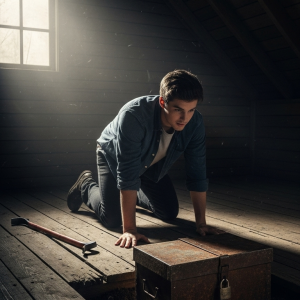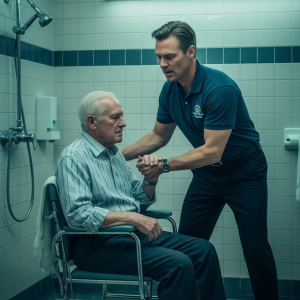Ten years after he had vanished, Jack Riley returned to his hometown not as a man, but as a ghost. He was a composition of scars, both visible and unseen, a man hollowed out by the deserts of a foreign war and the wilderness of his own mind. He didn’t come to reclaim his life; he came to watch the one he had abandoned.
From the window of a cheap motel room overlooking the town park, he saw his son, Leo, now a lanky teenager with a familiar, easy smile. He was tossing a football with a man Jack had only seen in photos. David Cooper. His ex-wife’s new husband. The boy’s new father.
As Jack watched, the sharp, sudden crack of a nearby construction nail gun sent him to the floor before he even registered the sound. His heart hammered against the cheap carpet, his breath coming in ragged gasps. The scent of stale cigarette smoke in the room was momentarily replaced by the phantom smell of hot metal, cordite, and sand. It was a reflex, a physiological echo of an ambush outside Fallujah, a memory that lived more in his nerves than in his brain. This was why he’d left. Not from a lack of love, but from an excess of damage.
He remembered the first few months after his final tour. The night terrors that left him drenched in sweat, his shouts waking a crying baby Leo in the next room. The way he’d flinch when Sarah, his wife, came up behind him too quickly. He saw a monster in the mirror, a man whose instincts were primed for threats that didn’t exist in this quiet, suburban world. He loved his son with a terrifying, aching intensity, and it was that very love that convinced him he was a loaded gun in his own child’s nursery. So he’d disappeared, choosing the sharp, clean pain of being a memory over the constant, terrifying risk of being a danger.
He watched for days. He saw David patiently help Leo with his homework at a picnic table. He saw Sarah laugh, a real, unburdened laugh that he hadn’t heard in years, as she leaned into her new husband’s embrace. He saw a family—stable, peaceful, and whole. They had built a good life on the ashes of the one he had torched. To reappear now would be an act not of love, but of pure selfishness.
A new resolve settled in his weary bones. He couldn’t be the father who was present, but he could be the one who provided. He couldn’t be a dad, but he could be a guardian. From the shadows, he would become their unseen protector, their silent benefactor. His war wasn’t over; it had just changed locations.
Life in the Cooper household was a tapestry woven with love and quiet struggle. David, a former Army mechanic, was a rock for both Sarah and Leo. He had stepped into a broken situation and, with patient, unwavering kindness, had built a home. He never tried to replace Jack; he simply loved Leo as his own, teaching him how to fix a bicycle chain, cheering the loudest at his soccer games, and offering steady advice with a warm smile.
But there were strains on their happy life. They weren’t wealthy people. Sarah worked as a nurse, and David ran a small auto-repair shop. Their conversations, once Leo was in bed, were often about the mortgage, the rising cost of groceries, and the future. “He’s getting so smart, Sarah,” David would say, pride and worry mingling in his voice. “He’s talking about engineering programs. The tuition for those places… it’s like buying a house.”
An even darker cloud loomed on the horizon. A piece of shrapnel from David’s own service in the Balkans, long dormant near his spine, had begun to cause debilitating pain. The local doctors were out of options. “The specialist in Boston used the words ‘experimental’ and ‘prohibitive’ in the same sentence,” David told Sarah one night, his face grim. “There’s a new microsurgery that could fix it. But the VA won’t cover it. The cost is astronomical.”
Far away, in places that didn’t appear on any tourist map, Jack Riley was making a series of deposits. He had taken his specialized skills to the private sector, working high-risk security contracts for corporations moving through war-torn countries. He lived out of a duffel bag, his only comforts a satellite phone and a worn photograph of a son who barely remembered him.
Between missions, in dusty, temporary barracks, he would write letters he knew he could never send. “Dear Leo,” he’d scrawl in a small notebook. “Today you turn sixteen. I wonder if you’re driving yet. Be careful with that. Your mom always worried about your lead foot. I saw a picture of you online in your soccer uniform. You look strong. You look happy. That’s all I’ve ever wanted. I’m so proud of the man you’re becoming. Love, your father.” He would then tear the page out and burn it, the smoke a prayer sent into an indifferent sky. He was earning a fortune, every dollar stained with risk and isolation, and funneling it anonymously through a military lawyer he trusted into a carefully structured trust. A ghost’s provision for a life he couldn’t share.
The miracles began to arrive quietly, delivered by the mailman. The first was a thick, official-looking envelope from a prestigious law firm. It informed them that an anonymous benefactor had established a full, four-year scholarship and living stipend for Leo at any university of his choosing. Sarah wept with relief. David hugged Leo, his heart swelling with a gratitude so immense it was painful.
The second, and greater, miracle came six months later, as David’s health was in a steep decline. Just as they were having the heart-wrenching conversation about selling their home to pay for the surgery, another letter arrived. This one was from the hospital’s billing department. It was a statement, showing the full, terrifying cost of the experimental procedure, and then, a single line at the bottom: “Paid in full by the Covert Valor Veterans Fund.”
They were stunned into silence. David had never heard of such a fund. He called the hospital, who could only confirm that the payment was real and had been wired from an attorney’s trust account. For Sarah and Leo, it was a blessing from heaven, an unbelievable act of charity. But for David, a man who understood the intricate, often frustrating, bureaucracy of veterans’ affairs, it didn’t make sense. Funds like this didn’t just appear out of nowhere.
A soldier’s instinct, long dormant, kicked in. He felt a nagging unease, a sense that there was a story here he wasn’t seeing. He started to dig. He used his old army contacts to look into the “Covert Valor Veterans Fund.” It didn’t exist. It wasn’t a registered charity. It was a name, a shell, created for a single, massive transaction.
His search became a quiet obsession. He tracked the wire transfer back to its source: the law office of Colonel (Ret.) Marcus Thorne, a man known for his discreet work with special operations personnel. Something clicked in David’s mind. This wasn’t charity. This was personal. This felt like a debt being paid. He booked a flight to Washington D.C., telling Sarah he was following up on a VA appeal. In truth, he was following the ghost.
The law office was stark and professional, decorated with military honors and photos of stern-faced men in uniform. Colonel Thorne was a man who seemed carved from the same granite as the monuments outside his window. He listened patiently as David laid out his story—the college fund, the mysterious payment, the dead-end search.
When David was finished, the lawyer looked at him with a deep, weary respect. “Sergeant First Class Jack Riley was a man of his word, Mr. Cooper,” Thorne said, his voice quiet but firm. “My final instruction from him was to give you this, should you ever come looking. He was certain that a good soldier like you wouldn’t be able to let a mystery go.”
He paused, his next words landing with the weight of a coffin. “I’m sorry to be the one to tell you. Sergeant Riley was killed in action three months ago during a private contract in West Africa. The funds for your surgery were the final payment from that contract.”
The air left David’s lungs. The ghost he had been chasing was gone. The man who had anonymously saved his life was dead. Thorne rose and retrieved a polished wooden box from a safe. He placed it on the desk between them. “His personal effects. He wanted you to have them.”
With trembling hands, David opened the box. The first thing he saw was a Purple Heart medal, its purple and white ribbon crisp, the bronze heart gleaming. Beneath it were mission files, heavily redacted, but detailing the dangerous, high-threat environments Jack had operated in for the past decade. He saw pay stubs for staggering amounts, each one followed by a transfer slip to the trust account managed by Thorne.
And at the very bottom was a thick, sealed envelope. On it, in familiar handwriting, were two words: For Leo. It was Jack’s final letter. Thorne gave a slight nod, giving him permission. David opened it and began to read the final words of the man he had replaced.
“My Dearest Leo,
If you are reading this, it means I kept my promise. Not the one to come home, but the one that truly mattered: the promise to make sure you were safe and happy. I know you don’t remember me well, and for that, I am both sorry and grateful. I need you to know that I didn’t leave because I didn’t love you. I left because I loved you. The war brought a sickness to my mind, a darkness I couldn’t control, and I couldn’t bear the thought of that darkness ever touching you.
So I did the only thing I knew how to do. I fought. I took on hard jobs in hard places so that I could build a wall of protection around the life you deserved. A life with peace, with opportunity, and with a good father to guide you. From what I’ve seen, you got the best. David is the father I should have been. A better man. Love him, learn from him, and never doubt for a second that he is your dad in every way that counts.
A father’s job is to protect his son. Some do it from across the dinner table. I had to do it from across the world. It was the only way I knew how. Be kind to your mother. Grow into the good man I know you will be. That’s all I ever wanted. My war is over now, son. Live a long, happy, and peaceful life. You earned it.
All my love, forever, Your father, Jack.”
David sat in the silence of the office, tears streaming down his face for the fallen soldier he had never met, a man whose final, violent act on this earth had been one of profound and selfless love.
David returned home not with an answer, but with a legacy. He sat with Sarah in their living room late into the night, the contents of the wooden box laid out on the coffee table between them. He told her everything, and then he read her the letter.
The last vestiges of resentment she had held for Jack, the quiet anger at the man who had abandoned her with a baby, crumbled away, replaced by an overwhelming wave of grief and a profound, heartbreaking understanding. The man she had once loved hadn’t run from them; he had run to protect them, in the only broken way he knew how. The image of the deadbeat father was destroyed, replaced by the tragic silhouette of a wounded soldier standing a lonely watch.
They agreed, without hesitation, that Leo had to know. This truth was not a burden to be hidden, but a heritage to be claimed. The next day, they sat their son down, the wooden box on the table. David, his voice thick with emotion, told Leo the story of a soldier named Jack Riley. He told him about the darkness of war, the invisible wounds, and the ferocious, protective love that had fueled a decade of sacrifice.
Finally, he handed Leo the letter. The boy read it, his face a canvas of confusion, then sorrow, then a dawning, tearful pride. He looked up, his eyes meeting David’s. “So, I had two dads?” he asked, his voice cracking.
David nodded, putting a steadying hand on his shoulder. “Yes, you did,” he said, his own voice thick with emotion. “You had the one lucky enough to be here every day to raise you. And you had one who loved you so much, he guarded your life from half a world away. Not every kid is that lucky.”
From that day on, Jack Riley was no longer a ghost in their home. His Purple Heart was placed on the mantelpiece, next to a family photo of Sarah, David, and Leo. He became a part of their story, a testament to the fact that fatherhood is measured not in presence, but in love.
David, after his full recovery from the surgery Jack had paid for with his life, expanded his local veteran support group. He used the remaining funds from Jack’s trust as seed money. He renamed it “The Jack Riley Project,” creating a haven for wounded warriors struggling to find their way back to a world of peace.
Leo went off to college, his future secured by a father’s love. He grew into a fine young man, proud and strong, carrying the unique honor of being raised by two heroes: the one who tucked him in at night, and the one who had fought monsters in the dark to ensure he would have a bed to sleep in at all. Jack’s legacy was not in what he had left behind, but in the beautiful, safe, and loving life his sacrifice had made possible.




